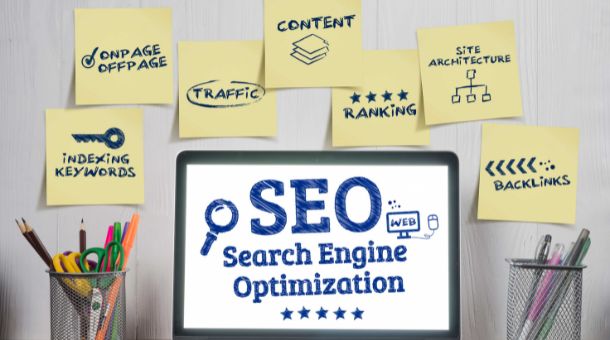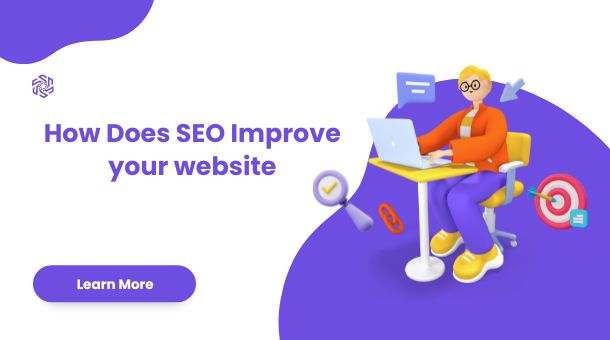Question is that How Does SEO Improve your website? Since the introduction of the Internet web, web admins have been looking for ways to put their sites in the top spot of results. The first approach was to include many keywords on their websites regardless of whether they were relevant to the information they were selling.
This strategy worked at a time when search engines were primitive and no websites competing for attention. In the current age, search engines such as Google are equipped with sophisticated algorithms that let them discern between thousands of websites; having an effective SEO (also called search engine optimization (or SEO)) is crucial.
Nowadays, SEO is about using the correct keywords in the right places and creating excellent content, a strong connection profile, and a great user experience.
It requires a lot of time and effort to attain an effective result. So why do website owners do it? Why are they worried about how their website is displayed in the results of a search? What can they gain from this?
This page will explain the importance of SEO and why it is crucial for companies looking to establish their presence on the web. It also provides a few tips to help you begin the SEO strategy you plan to implement.
What is SEO?
SEO refers to the term “search engine optimization“ It’s a method developed to improve the look and ranking of websites in natural search results. Because organic search is by far the most popular method used by users to browse websites and web content, a solid SEO strategy is vital to increasing the quantity and quality of the visitors your website receives.
What is it that makes SEO important in marketing?

SEO is an important element of digital marketing since consumers perform thousands of searches each year, typically for information about commercial products and to locate specific information regarding items and products.
It’s often the most important source of website traffic for businesses, and it can also be an additional traffic source to other marketing channels. A higher ranking and better visibility in search results over rivals can greatly impact your revenue.
However, the pages showing outcomes have also been developing over the last couple of years to provide users with more specific information and answers that will keep users on the site to see the results instead of redirecting users to other sites.
Pay attention to features such as the results of a search which are packed with information and knowledge. Panels within the results of the Google search can increase visibility and offer users additional details about your company right within the results.
In simple words, SEO is the foundation of a complete marketing strategy. Knowing what people who come to your site might like and would like is possible. In this case, you could apply that knowledge to your advertisements (paid as well as natural) on your website, social media websites, and more.
How Does SEO Improve your website?

In the beginning, you must boost the SEO of your site to get more attention.
These steps will help you to ensure you’re successful in your SEO efforts. The second step is to concentrate on conversions whenever you publish new content or update.
When you go through all the content on your site, One atom of data could not give any data. However, you’ll start to notice patterns when you collect a lot of data.
If you’ve seen a few people visit your website but do not click on your CTA, probably there’s no trouble.
If, on the other hand, you find that a large majority of people don’t click your CTA, then it’s likely that you need to alter your plan of course of action.
User behavior reports and Google Search Console traffic data can aid in creating an exact picture. Reports on user behavior will show the things visitors do after visiting your website.
GSC reports track key indicators, such as the amount users who visit your site, amount of sessions that have special bounce rates, bounce rates of users, and numerous other indicators.
Analyze the data to find certain patterns. The sources of the referrals may reveal information about your target market. What’s the method for the way people find your website? Search for pages that attract higher traffic and conversion rates compared to other websites. Reverse engineering is a method to duplicate the page on your website.
1: Conduct an extensive Keyword search
A few years ago, when I was in school, I chose a keyword that was not a direct result of a search and wrote a 300-word piece that was possible, and the keyword ranked within a day. SEO hasn’t been functioning in that manner now.
Ubersuggest can help you identify keywords relevant to your company and specific area. It could help you identify long-tail keywords that match your customers’ expectations. Consider why they’d search for a particular phrase and what they expect to see on your web page.
Begin with a broad statement. For instance, perhaps you offer dog boarding, starting with a phrase such as “dog kennels.”
Ubersuggest provides you with a set of keywords that you can sort according to various ways. You’re searching for keywords with a long tail that can be used to draw your attention to a specific group of the population.
Repeat the process until you add more pages to your website. Write long concise pieces that give as much detail on the subject matter as is possible.
2: Making content that lasts and is useful in its way
Buffer Buffer According to Buffer Buffer, the optimal length of a blog post for bloggers, can be as long as 1,600 words. It is an estimate, however.
Before choosing the perfect length of your article, Google your primary keyword and then look through the results that are among the top 10 results on the SERPs. Does any one of these longer than 1600 words? You can likely locate that, too.
It’s not the entire story. It’s a sign to Google Google that you’re providing more details. If many people visit your website until the end of your page, it means your website is more likely to be found.
3: Optimize your website to rank on the first page of search engines
Search Engine Optimization (SEO) on-page can assist you in optimizing your website’s performance by designing specific pages. This category belongs to subheadlines, headlines, URLs, Slugs, and Meta Tags.
Include your keywords in the headline, and then do it right away. It should appear in the slug and, at minimum, at least one subheadline. When you write in your body paragraph, try to achieve .5 percent, and increase it to 2.5 percent. Do not go beyond the limit to prevent it from being viewed as an over-saturated keyword.
Be sure to include the most important and relevant keywords within the body copy, body text, as well as in captions, subheadlines, and your images. Include plenty of details on each to make sure that Google understands the subject you’re talking about.
4: Optimize Off-page SEO
Off-Page SEO (also known as Off-site SEO ) is the method of optimizing your site using external methods. Guest blogging, blogs, Social Media, and Guest Blogging actions like Influencer Marketing, influencer marketing, and the mention of brand names could all be a part of improving the SEO of your website.
We’ll be discussing specific backlinks soon. However, links generally have a huge influence on SEO. Links from smaller, less-authority websites aren’t a good idea. They’re not likely to gain (and they could create harm). It is better to find well-known sites to gain backlinks.
The Final Words
How Does SEO Improve your website? SEO can be a significant benefit for websites and can result in a long-lasting exponential increase. Businesses investing in SEO will build confidence and credibility with clients and make it an integral element of their digital marketing strategy.

